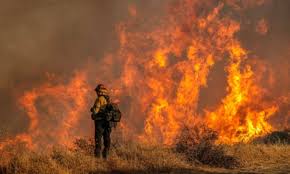The death toll from devastating wildfires in California’s Los Angeles region has risen to 24, according to the city’s medical examiner on Sunday.
The Eaton Fire near Pasadena has claimed 16 lives, while the Palisades Fire in Pacific Palisades has accounted for eight fatalities. Both fires, which began last Tuesday, are among the most severe blazes in the area, with officials warning the toll may rise as emergency responders face challenges accessing affected regions.
Firefighters are bracing for worsening conditions, with the U.S. weather service predicting wind speeds of up to 110 kilometers per hour on Sunday. The dry vegetation and strong gusts are expected to fuel the rapid and unpredictable spread of existing and new fires.
The California Department of Forestry and Fire Protection (Cal Fire) has issued a “critical fire weather” warning through Wednesday, covering areas from Ventura to San Diego. “Life-threatening winds and dangerously low humidity are forecast for much of Southern California, increasing the risk of rapid fire spread,” Cal Fire posted on X. The department also advised residents to avoid risky activities like mowing lawns, parking on dry grass, and leaving campfires unattended.
As of Sunday, the fires have destroyed or damaged approximately 12,300 structures and burned through nearly 163 square kilometers of land—an area nearly the size of Washington, D.C.
California Governor Gavin Newsom described the wildfires as potentially the worst natural disaster in U.S. history, citing their unprecedented scale, scope, and financial impact. Newsom signed an executive order to fast-track rebuilding efforts for victims, temporarily suspending environmental regulations.
“Victims of the SoCal fires shouldn’t have to face bureaucratic delays as they rebuild their lives,” Newsom wrote on X.
According to preliminary estimates by AccuWeather, the wildfires have caused more than $135 billion in damages.
Among those affected is former California governor and Hollywood actor Arnold Schwarzenegger, who assured fans that he and his animals are safe. “Don’t worry about me or my house. Think of the heroic firefighters,” he said.
Attention has also turned to the firefighting efforts, which include hundreds of inmates volunteering to assist in the battle. These prisoners, trained for several days, earn $10 a day and $1 per hour for emergency work, with their sentences reduced by two days for each day spent on the frontlines. Only inmates serving sentences of up to eight years and convicted of non-violent crimes are eligible for deployment.
As firefighters and volunteers continue their efforts, California remains on high alert, with officials urging residents to prioritize safety and prepare for potential evacuations.


